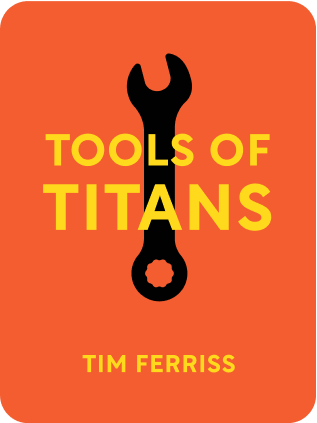

This article is an excerpt from the Shortform book guide to "Tools of Titans" by Timothy Ferriss. Shortform has the world's best summaries and analyses of books you should be reading.
Like this article? Sign up for a free trial here .
Do you have a business idea in mind? What are some things you should consider before you embark on its execution?
In his book Tools of Titans, entrepreneur and lifestyle guru Tim Ferriss shares the advice of 101 highly successful people he refers to as “titans.” Many of the titans he interviewed for the book are entrepreneurs of some kind. We’ve distilled their advice below.
In this article, we’ll cover titans’ advice for starting a business.
Starting a Business: Learn From Titans
In his epic 707-page Tools of Titans, Tim Ferriss shares the habits and beliefs of 101 people at the top of their game. Many of the people profiled in the book are successful businessmen. Here’s a spread of titans’ advice for starting a business.
The Law of Category. With a new product, don’t ask yourself, “How is this new product better than the competition?” but rather, “What new category is this product the first in?” People are defensive about a new entrant encroaching on their favorite brands, but they’re more open with whole new categories.
- IBM was first in the computing category. DEC was first in the minicomputing category.
Don’t think 10% bigger, think 10 times bigger. When you go 10 times bigger, you have to start with a new approach. You’re by yourself in a new space, not competing with everyone else who’s also trying to get 10%.
Don’t head for a hyper-competitive area. Competition is hard and sucks the profit out of companies.
- Paypal co-founder and tech investor Peter Thiel has in the past been too focused on beating competitors, rather than on doing something that’s important. He also believes competition is a terrible thing for company health, preferring monopolies that can avoid competition. Ask yourself, “How can I be more successful by being less competitive?” (Shortform note: Read more about his stance on competition in our summary of Thiel’s book Zero to One.)
- Investor Eric Weinstein was previously a professor in academia, but switched to technology. He found that academia was a small, declining world where people were defensive and thus were on their worst behavior. In contrast, technology is a growing industry and much more open.
You don’t need as much as you think. Use what you have.
- Director Rob Rodriguez makes a list of assets he has and builds a film around the list, to keep his budget lean. His cousin had a ranch in Mexico, so that’s where he decided to shoot. His cousin also had a turtle, so that made it into the movie. His lack of resources also affected his style—because he didn’t record good audio, he cut rapidly when it got out of sync, which led to his trademark style.
- Alibaba founder Jack Ma: “There were three reasons why we survived: We had no money, we had no technology, and we had no plan. Every dollar, we used very carefully.”
Create new ideas by connecting existing ideas that have never been connected before. Something that is a commonplace solution in one area connected to another.
- Inventor Robert Plath reinvented luggage by putting two wheels and a telescoping handle on it.
- Table tennis player Hiroji Satoh was the first person to put a sponge on his racket.
Mindsets
Failure is not good. While this might sound obvious, accepting failure has become a common mindset in tech startups. In contrast, failure is actually painful and should be avoided.
- Founder and investor Marc Andreessen feels that pivoting from a company that isn’t working is too easy of an option and overvalued. Instead, put the time into figuring it out and getting it right.
- Peter Thiel also believes failure is overrated. While people think they can learn a lot from failure, Thiel believes that most businesses fail for a variety of reasons, and so you don’t learn anything at all. Failure of a business can be damaging and demoralizing.
- Jack Dorsey agrees that the worst advice given in his trade is “fail fast!”
Understand fundamental principles, not just tactics. Business tactics become outdated. Learn the principles of business (like behavioral psychology) and you will create new tactics that adapt to the times.
Take a short-term loss for a long-term advantage. Be patient for the big reward.
- When making the film Twins, Arnold Schwarzenegger took zero salary in exchange for a percentage of the profits. It turned out to be his most profitable film ever.
- When making Star Wars, George Lucas negotiated for toy rights when the studio dismissed them as meaningless.
- Think of ways that you can bet on yourself while lowering risk for the other party. Can you work at a company you really like for free but with more equity?
Business Operations
Charge for what you’re selling. The conventional wisdom in Silicon Valley is to price your product low, or even free, to get mass penetration and volume. However, this causes problems with being unable to fund sales and marketing to rev up the growth engine. People paying for your product is proof that it’s good; if your product is free, you don’t know how much you can later charge for it.
- Photographer Chase Jarvis charged a high professional rate of $2,500 a day for his first day-rate gig. He had to deliver value equivalent to this, but by that point he had already trained his craft and was confident he could.
- Author Ramit Sethi gives away 98% of material for free, then charges very high prices for his flagship courses, which are 10 to 100 times more expensive than what competitors charge.
- For his podcast, Tim Ferriss didn’t take advertisers until he had over 100,000 downloads per episode. This let him avoid having to take small fish sponsors. He also sometimes runs high-priced events costing $10,000 per seat, with 200 seats.
Execute quickly. Peter Thiel asks, “If you have a 10-year plan, why can’t you do this in 6 months?”
Let your subordinates execute quickly and make decisions themselves.
- LinkedIn founder Reid Hoffman empowered his employees to make judgment calls. He accepted an error rate of 10-20% if it meant people could move fast.
- When building his supplement company, Tim Ferriss was overloaded on customer support and a bottleneck for decision making. He gave his customer support team discretion for decisions with less than $100 at risk. Nothing exploded, and the business continued working fine, but he reduced his customer support time from 40 hours per week to 2. He says that people seem to get smarter once you give them responsibility and they feel you trust them.
Rule of 3 and 10: Everything in the company breaks when you grow by 3 times and when you grow by 10 times. Startups should expect to reinvent their company at these breakpoints.
- Army general Stanley McChrystal has a similar recommendation: at battalion level (600 people), commanders need to lead a different way, from managing everything themselves to developing managers who will take care of the details.
- Big companies have the opposite problem of startups, in that they plan for a tripling that may never happen, then get bogged down in all the extra processes.
Recruit by starting with why. Tell people what the purpose of what they’re doing is, before telling them what to do.
- Filmmaker Rob Rodriguez recruits actors for his low-budget films by telling them they’ll have an experience unlike any other. They’ll feel invigorated and have fun, and they’ll get great reviews.
- (Shortform note: Read our summary of Simon Sinek’s Start With Why for more on this idea.)
The person who cares less, wins. This is especially true in negotiation. Build yourself to a position where you can afford to care less.
- As a bodybuilder, Arnold Schwarzenegger really wanted to get into acting, but he avoided taking bit parts at first. Instead, he became independently wealthy through real estate, which then let him wait for the big film.
Here’s a smattering of marketing ideas:
- Send out email newsletters:
- Author Ramit Sethi generates 99% of his revenue through email. They’re crafted to be simple 1-on-1 emails, even though behind the scenes there’s a lot of optimization.
- To find press contacts who covered products similar to yours, use Google Image reverse search of a picture of your product.
- To get warm introductions to press writers, use Facebook or Linkedin to find people connected to writers you want to reach.

———End of Preview———
Like what you just read? Read the rest of the world's best book summary and analysis of Timothy Ferriss's "Tools of Titans" at Shortform .
Here's what you'll find in our full Tools of Titans summary :
- The habits and beliefs of 101 people at the top of their game
- Tim Ferriss' list of 17 questions you should ask yourself to challenge your thinking
- How emulating the habits of successful people you look up to can make you successful as well






